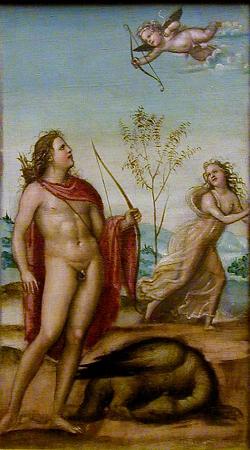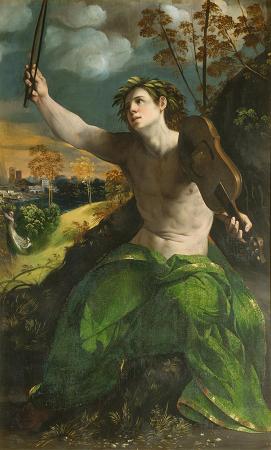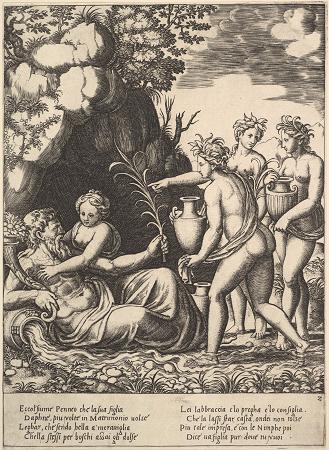Daphne. Daphne a minor figure in Greek mythology, is a naiad, a variety of female nymph associated with fountains, wells, springs, streams, brooks and other bodies of freshwater. She is said by ancient sources variously to have been a daughter of the river god Peneus and the nymph Creusa in Thessaly or of Ladon or Pineios, and to Ge. There are several versions of the myth in which she appears, but the general narrative appears in Greco-Roman mythology, is that due to a curse made by the god Cupid, son of Venus, on the god Apollo, she became the unwilling object of the infatuation of Apollo, who chased her against her wishes. Just before being raped by him, Daphne pleaded to her river god father for help, who transformed her into a laurel tree, thus foiling Apollo. Thenceforth Apollo developed a special reverence for laurel. At the Pythian Games which were held every four years in Delphi in honour of Apollo, a wreath of laurel gathered from the Vale of Tempe in Thessaly was given as a prize. Hence it later became customary to award prizes in the form of laurel wreaths to victorious generals, athletes, poets and musicians, worn as a chaplet on the head. The Poet Laureate is a well-known modern example of such a prize-winner, dating from the early Renaissance in Italy. According to Pausanias the reason for this was simply and solely because the prevailing tradition has it that Apollo fell in love with the daughter of Ladon. Most artistic depictions of the myth focus on the moment of Daphne's transformation. The earliest source of the myth of Daphne and Apollo is Phylarchus, quoted by Parthenius. Later, the Roman poet Ovid does a retelling of this Greek legend, which appears in his work Metamorphoses. The pursuit of a local nymph by an Olympian god, part of the archaic adjustment of religious cult in Greece, was given an arch anecdotal turn in the Metamorphoses by the Roman poet Ovid. According to this version Apollo's infatuation was caused by a golden-tipped arrow shot at him by Cupid, son of Venus, who wanted to punish Apollo for having insulted his archery skills by commenting What hast thou to do with the arms of men, thou wanton boy?, and to demonstrate the power of love's arrow. Eros also shot Daphne, but with a leaden-tipped arrow, the effect of which was to make her flee from Apollo. Elated with sudden love, Apollo chased Daphne continually. He tried to make her cease her flight by saying he did not wish to hurt her. When she kept fleeing, Apollo lamented that even though he had the knowledge of medicinal herbs, he had failed to cure himself from the wound of Cupid's arrow. When Apollo finally caught up with her, Daphne prayed for help to her father, the river god Peneus of Thessaly, who immediately commenced her transformation into a laurel tree: a heavy numbness seized her limbs, thin bark closed over her breast, her hair turned into leaves, her arms into branches, her feet so swift a moment ago stuck fast in slow-growing roots, her face was lost in the canopy. Only her shining beauty was left. Even this did not quench Apollo's ardour, and as he embraced the tree, he felt her heart still beating. He then declared: My bride, he said, since you can never be, at least, sweet laurel, you shall be my tree. My lure, my locks, my quiver you shall wreathe. Upon hearing his words, Daphne bends her branches, approving his decision. A version of the attempt on Daphne's sworn virginity that has been less familiar since the Renaissance was narrated by the Hellenistic poet Parthenius, in his Erotica Pathemata, The Sorrows of Love. Parthenius' tale, based on the Hellenistic historian Phylarchus, was known to Pausanias, who recounted it in his Description of Greece. In this, which is the earliest written account, Daphne is a mortal girl, daughter of Amyclas, fond of hunting and determined to remain a virgin; she is pursued by the boy Leucippus, who disguises himself in a girl's outfit in order to join her band of huntresses. He is also successful in gaining her innocent affection. This makes Apollo angry and he puts it into the girl's mind to stop to bathe in the river Ladon; there, as all strip naked, the ruse is revealed, as in the myth of Callisto, and the affronted huntresses plunge their spears into Leucippus. At this moment Apollo's attention becomes engaged, and he begins his own pursuit. Daphne, fleeing to escape Apollo's advances, prays to Zeus to help. Zeus turns her into laurel tree. Parthenius' modern editor remarks on the rather awkward transition, linking two narratives. The name Daphne, in Greek, means laurel.
more...













